
Are you tired of dealing with stubborn kitchen drain blockages? There are various factors that can lead to this frustrating issue, from grease and oil buildup to tree roots invading your pipes.
We will explore the common causes of kitchen drain blockage and provide practical tips on how to prevent it. Discuss effective methods for fixing a blocked drain, whether you opt for DIY solutions or seek professional help.
Learn about the signs of a serious drain blockage that you should never ignore!
Table of Contents
Kitchen drain blockages are a common issue that many homeowners in Milwaukee and the Greater Milwaukee area face, often leading to standing water and the need for professional services. Understanding the root causes can help in preventing future instances of clogged drains.
Find out more: How To Put Drain Cleaner In Toilet
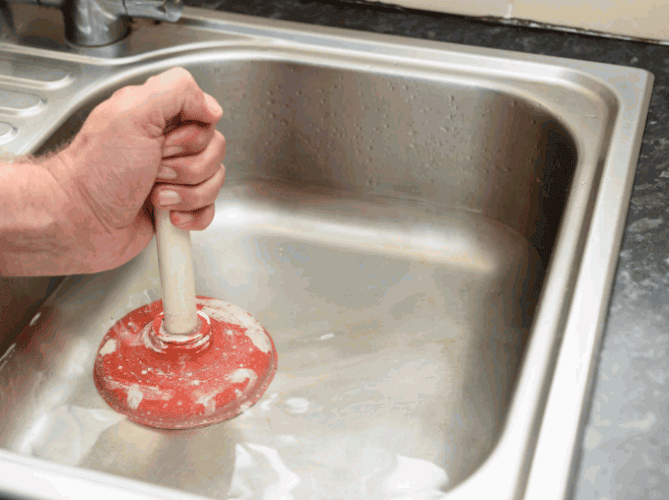
Grease and oil buildup is one of the most frequent causes of clogged kitchen drains.
When we cook regularly, it's inevitable that some grease and oil will find their way into the sink. Initially, these substances may be in liquid form, but as they cool down, they solidify and stick to the inner walls of the pipes. Over time, this buildup accumulates and can lead to serious blockages.
While garbage disposals help by breaking down some of the smaller food particles, they are often not equipped to handle the greasy residue that clings to the pipes. Therefore, it's crucial to establish a routine maintenance schedule to prevent these issues, saving yourself both time and money in the long run.
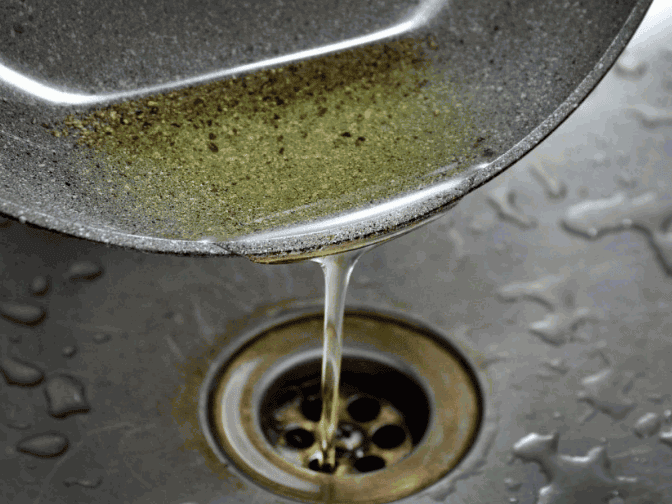
Food particles and debris are another major culprit when it comes to kitchen drain blockages.
When food scraps and other remnants are not properly disposed of, they can easily find their way into the pipes, creating a buildup that restricts water flow and leads to clogs. These blockages can result in standing water, unpleasant odours, and even more serious plumbing issues if left unaddressed.
Therefore, it is crucial for individuals to properly utilize garbage disposal to break down food waste before it enters the drain system. By doing so, you can help prevent blockages and maintain the smooth functioning of your kitchen plumbing.
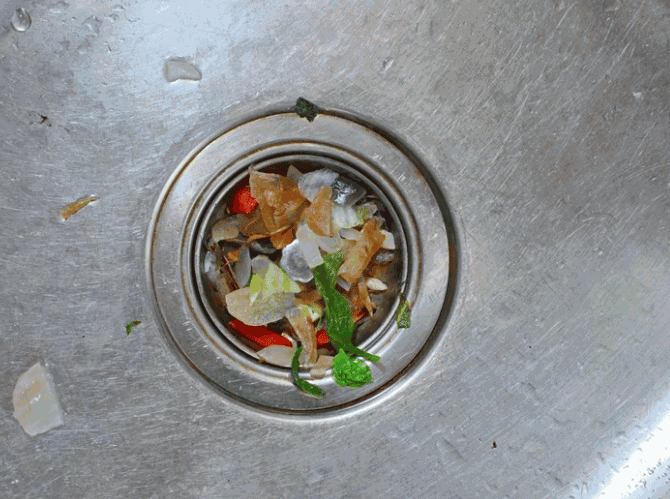
Soap and detergent residue can contribute significantly to clogged kitchen drains over time.
When soap comes into contact with minerals in water, the fatty acids present in the soap can combine with these minerals to create a tough residue that gradually builds up in drains. This residue can lead to blockages, restricting the flow of water and causing unpleasant odours. The best way to prevent this common issue is by using drain cleaners periodically to break down the residue and keep the drains clear. By incorporating drain cleaning into your regular maintenance routine, you can avoid costly and inconvenient plumbing problems in the future.
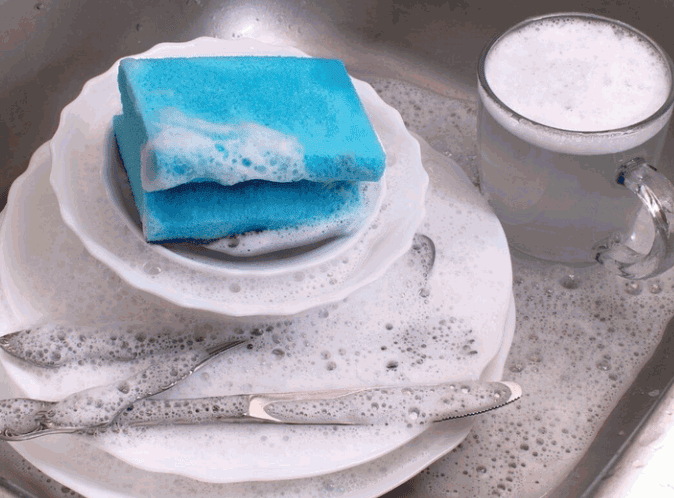
In the Greater Milwaukee area, tree roots can often invade underground pipes, causing severe drain blockages.
When trees are planted close to residential or commercial properties, their roots naturally seek out water sources. Over time, these roots can grow into sewer lines, drainage systems, or plumbing pipes, leading to clogs and blockages. This can result in slow drains, backups, or even complete pipe ruptures if left untreated.
To prevent tree root invasion, it's essential to plant trees a safe distance away from any underground pipes. Regular inspections by plumbing professionals can also help detect early signs of root intrusion before they develop into major issues.
When faced with tree root blockages, do-it-yourself remedies like chemical cleaners or makeshift tools may not be effective in clearing the obstruction. In such cases, it's best to seek the expertise of professional plumbers equipped with specialized tools and knowledge to safely remove tree roots from the pipes without causing further damage.
Preventing kitchen drain blockages is crucial for maintaining a smoothly functioning kitchen, and a team of experts offers advice to homeowners in Milwaukee on how to achieve this.
One of the simplest ways to prevent kitchen drain blockages is to avoid pouring grease and oil down the drain.
When grease and oil are poured down the drain, they may cause a buildup on the pipe walls over time, leading to clogs that can be expensive and challenging to remove. Not only do these substances constrict the flow of water, but they can also attract other debris, exacerbating the issue.
To prevent this from happening, it is advisable to collect grease and oil in a designated container, such as an old can or jar, and dispose of it in the trash once it solidifies. This simple practice can go a long way in maintaining the proper functioning of your drains and preventing potential plumbing problems down the line.
Using a drain strainer is an effective way to prevent food particles and debris from entering your kitchen drain.
By placing a drain strainer over the sink drain, you can easily catch food scraps, hair, and other gunk before they cause clogs. This simple yet essential kitchen tool not only helps maintain proper drainage but also extends the lifespan of your plumbing system. A drain strainer is environmentally friendly as it reduces the need for harsh chemicals to unclog drains.
There are various types of drain strainers available, including mesh strainers, perforated strainers, and twist-and-drop strainers. Depending on your needs and sink type, you can choose the most suitable one.
To keep your drain strainer in top condition, remember to clean it regularly by removing trapped debris and rinsing it with warm soapy water. Proper maintenance ensures optimal performance and longevity of the strainer.
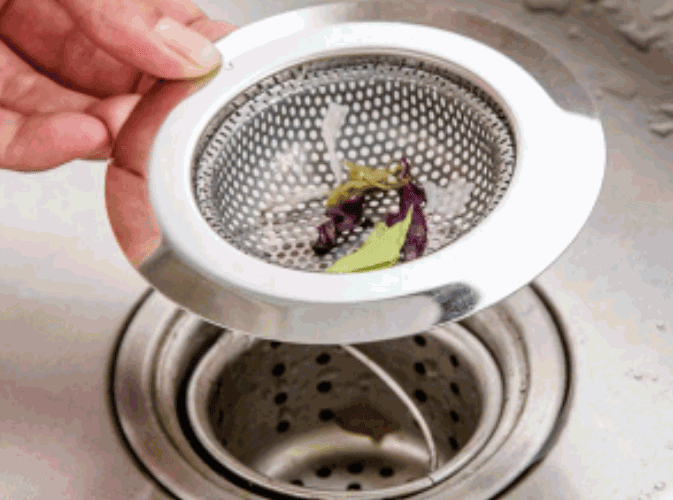
Regularly cleaning the drain can go a long way in preventing blockages.
One effective method for keeping your drain clear is to pour a mixture of vinegar and baking soda down the drain, followed by hot water to flush out any debris.
Another handy tip is using a drain snake to physically remove any clogs that may have accumulated over time.
Consistency is key when it comes to drain maintenance; implementing these cleaning methods on a regular basis can help ensure a blockage-free drain and smooth water flow.
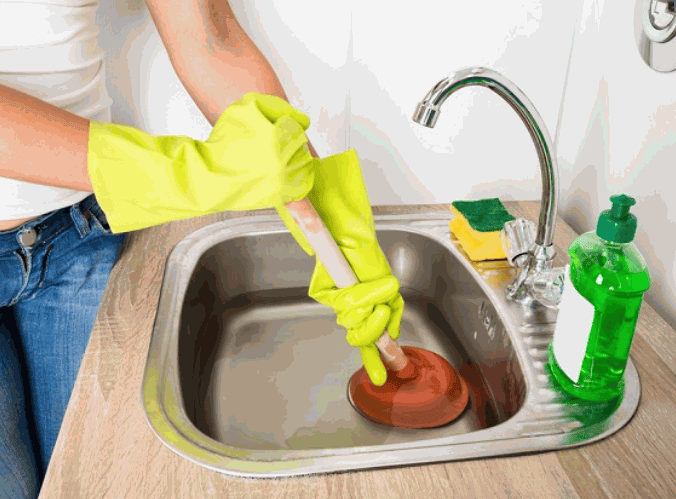
Avoiding flushing food particles down the drain is a simple yet effective way to prevent kitchen drain blockages.
Food particles in drains can accumulate over time, leading to clogs and unpleasant odours. When disposed of properly, these issues can be minimized.
A garbage disposal can play a significant role in breaking down food waste into smaller pieces that are easier to flush away without causing blockages.
To dispose of food waste correctly, consider using a compost bin for organic materials or a designated trash can for non-compostable items. By adopting these practices, you can maintain your drains and reduce the risk of costly plumbing repairs.
Fixing a kitchen drain blockage can be approached in several ways, ranging from DIY methods to professional intervention.
Using a plunger is one of the most straightforward methods to fix a clogged kitchen drain.
To properly use a plunger, start by ensuring there is enough water in the sink to cover the rubber cup. Place the cup over the drain opening, creating a tight seal to allow for effective suction. Maintain a firm grip on the handle and push down forcefully, then pull up quickly to create pressure that dislodges the blockage. Repeat this plunging motion several times if needed. Remember to use a plunger specifically designed for sinks and drains; common types include cup plungers and flange plungers, each suited for different drain sizes.
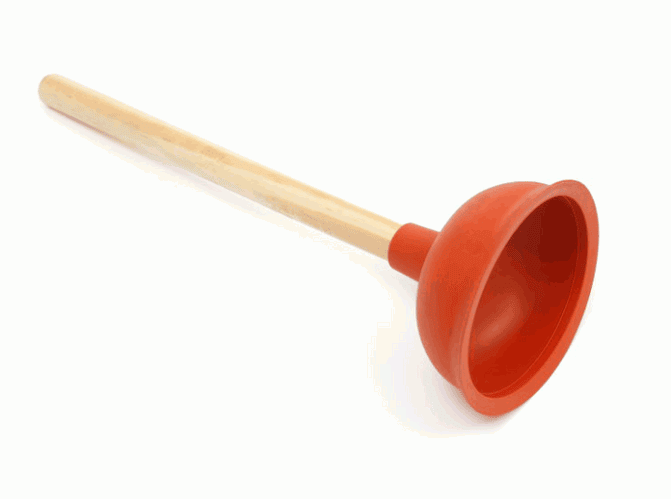
A homemade drain cleaner using boiling water, vinegar, and baking soda can be an effective solution for minor blockages.
Here's a simple step-by-step guide to make and use this homemade drain cleaner:
Using this homemade drain cleaner on a regular basis can help maintain clean and clog-free drains while avoiding harsh chemicals.
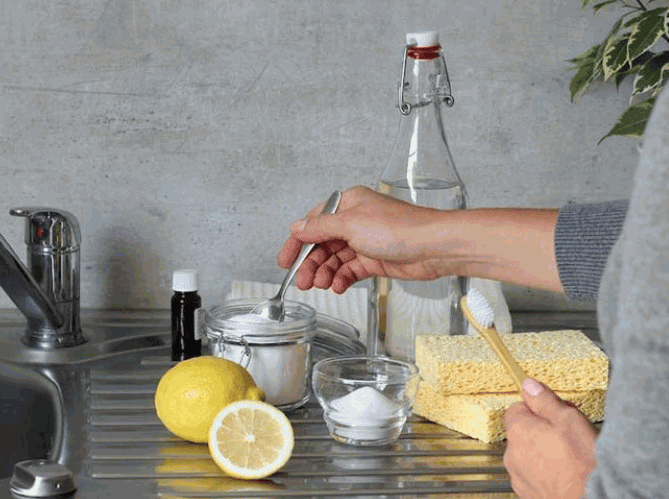
A plumbing snake is a useful tool for breaking up and removing blockages in your kitchen drain.
When you encounter a clog, the first step is to carefully feed the plumbing snake into the drain. Start by inserting the end of the snake, also known as the auger, into the drain opening.
Slowly twist and push the snake further into the pipe, making sure not to force it too aggressively to avoid damaging the pipe. Once you feel resistance, rotate the handle of the snake to break up the blockage. Keep feeding the snake until you feel the blockage has been cleared.
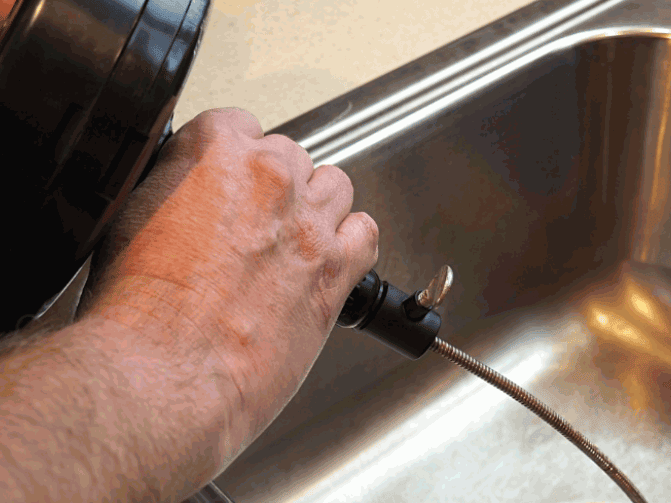
If all else fails, calling a professional plumber is the most reliable option.
Professional plumbers bring a wealth of expertise to the table, having undergone rigorous training and possessing in-depth knowledge of various plumbing systems.
They are equipped with specialized tools and equipment that are essential for tackling complex plumbing issues efficiently.
By opting for professional services, homeowners can benefit from guarantees on the work done, providing peace of mind and assurance that the job will be completed to high standards.
Scenarios where professional help is necessary include major leaks, sewer line backups, water heater malfunctions, and renovation projects requiring plumbing adjustments.
Recognizing the signs of a serious drain blockage early can help you take prompt action and avoid more severe plumbing issues, which is why it's beneficial to be aware of these signs and know when to call in professionals.
A slow draining sink is often the first sign of a serious clog in your kitchen drain.
This issue can be quite frustrating, disrupting your daily routines and potentially leading to more severe plumbing problems if left unaddressed. The accumulation of food particles, grease, soap residue, and other debris can gradually build up within the pipes, restricting the flow of water and causing the sink to drain slowly. It's crucial to take swift action when you notice this early warning sign to prevent a complete blockage.
To alleviate the slow drainage, you can start by using a plunger or a drain snake to attempt to dislodge the blockage. Alternatively, try pouring a mixture of hot water and vinegar down the drain to help break down the clog. In some cases, a commercial drain cleaner may also be effective in clearing minor obstructions. Regular maintenance and mindful disposal of kitchen waste can help prevent future blockages and keep your kitchen sink functioning smoothly.
A foul odour emanating from your kitchen drain is a strong indication of a serious blockage.
Trapped food particles and bacterial growth are the main culprits behind these unpleasant smells. When food debris gets stuck in the drain, it decomposes over time, causing a foul stench to permeate your kitchen. Bacterial growth thrives in moist environments, further exacerbating the odour problem.
To temporarily manage the smell, you can try pouring a mixture of hot water and vinegar down the drain or using baking soda to neutralize the odour. These are only temporary solutions. For a lasting fix, it's crucial to thoroughly clean the drain or seek professional help to address the underlying cause of the blockage.
Gurgling sounds coming from your kitchen drain are often a sign of a serious clog.
This peculiar noise is caused by air trapped within the pipes due to a blockage preventing the proper flow of water. As the water tries to pass through the obstruction, it pushes air bubbles, creating the distinct gurgling sounds you hear. If this issue is left unattended, it can lead to more severe plumbing problems, such as backups and leaks.
Regular maintenance of your drains can help prevent such issues in the future. It is crucial to address drain gurgling promptly to avoid more significant complications down the line.
Experiencing multiple clogged drains in your home is a clear sign of a severe blockage in your plumbing system.
When you notice that water is not draining properly in more than one area of your house, it is likely that the issue lies deeper within your plumbing system.
A main sewer line blockage may be causing this widespread problem, leading to backups and slow drainage across various fixtures.
To prevent potential damage and health hazards, it is crucial to address this issue promptly.
Attempting to resolve it on your own with store-bought solutions may provide temporary relief, but the underlying cause requires professional assessment and repair.